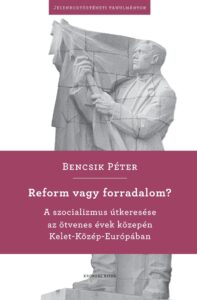
Béla Tomka's paper on TRAFO blog
The Berlin-based TRAFO Blog for Transregional Research published a paper by Béla Tomka entitled Beyond “Alternative Globalization” in Socialist Eastern Europe: A Critique of the Concept. The article is available here.

Béla Tomka's paper on the Great Depression
Béla Tomka’s contribution entitled “Hungary: Social and Political Consequences of the Great Depression” was published in the CEU Press collection “The Great Depression in Eastern Europe”, edited by Klaus Richter, Jasmin Nithammer and Anca Mândru. The book can be downloaded here.

Welcome to the department
Márton Simonkay, who has been working closely with us for the last six years as a member of the History of Globalization Research Group, was chosen to the position of Assistant Professor at the Department of Contemporary History. Congratulations and good luck! More information can be found on Márton Simonkay’s own page.

Béla Tomka's presentation at the University of Vienna
Béla Tomka gave a talk entitled “Globalization in State Socialist East Central Europe” at the Osteuropainstitut Universität Wien followed by a discussion of the presentation. The panelists were Prof. Dr. Philipp Ther, Dr. Agata Zysiak and Prof. Dr. Christian De Vito.

Katalin Baráth's talk in Vienna
On 3 December, Katalin Baráth gave a talk entitled The Implantation of the Global Genres of Mass Culture in Hungary in the Early 20th Century at the Universität Wien in Vienna.

Péter Bencsik's paper in HSR
Péter Bencsik’s paper, entitled The Impact of Emigration on Hungarian Citizenship Law, 1945-64 has been published in the Hungarian Studies Review.

Béla Tomka's new book published
Béla Tomka’s new book, entitled Globalization in State Socialist East Central Europe: Looking Beyond Dominant Narratives has been published by Palgrave Macmillan. The book is open access, and available on the publisher’s website on the publisher’s website.


Melinda Kalmár's higher doctorate
Melinda Kalmár has been awarded the title of Doctor of the Hungarian Academy of Sciences (DSc) as a result of today’s public debate, successfully defending her dissertation entitled Corporative, hybrid, Soviet. The metamorphosis of a formation. Congratulations!

Peter Bencsik's paper in Comparativ
Péter Bencsik’s paper, entitled Border Regimes, Freedom of Movement, and Globalization: the Hungarian and Czechoslovak Cases, has been published in Comparativ, a journal based in Leipzig. The study examines the relationship between globalization, freedom of movement, border regimes, and human rights, mainly in the 1970s and 1980s. The table of contents of the issue can be found here.

Béla Tomka's new book
Kronosz publishing has added a new volume to its new book series, entitled Contemporary History Studies. Béla Tomka’s Mítoszok és válaszok. Európai integráció és globalizáció a közbeszédben és a tudományban (Myths and Answers. European Integration and Globalization in Public Discourse and Scholarship) is already in the bookshops. More information on the publisher’s website.

Katalin Baráth's new book published
Katalin Baráth’s new book, entitled Szórakozik a tömeg. Fejezetek a modern populáris kultúra magyarországi történetéből (The crowd is having fun. Chapters from the History of Modern Popular Culture in Hungary) has been published by Kronosz Publishing as the second part of a new book series. More information on the publisher’s website (in Hungarian).

Péter Bencsik's new book
Péter Bencsik’s new book, entitled Reform vagy forradalom? A szocializmus útkeresése az ötvenes évek közepén Kelet-Közép-Európában (Reform or Revolution? State Socialist Alternatives in the mid-1950s in East-Central Europe), has been published. The book, a collection of earlier studies, focuses on the events of 1956 in Hungary and Czechoslovakia. It is the first part of the book series launched by the department with Kronosz Publishing.

Béla Tomka's talk in Regensburg
On 26 June, Béla Tomka gave a talk entitled “Globalization in East Central Europe after WWII: Narratives and Counter-narratives” at the Leibniz-Institut für Ost- und Südosteuropaforschung (IOS) in Regensburg.

Béla Tomka's new book
Béla Tomka’s new book, entitled Globalizáció Kelet-Közép-Európában a második világháború után: narratívák és ellennarratívák (Globalization in East-Central Europe after the Second World War: Narratives and Counter-narratives), has been published. The main text is accompanied by comments from nine experts, including two from our department.


